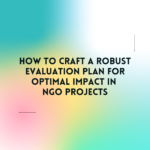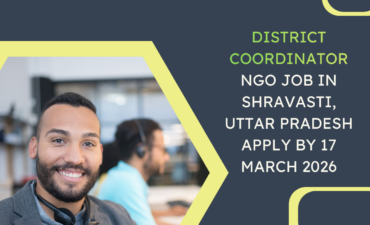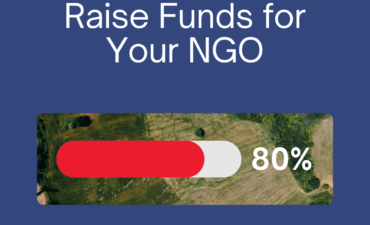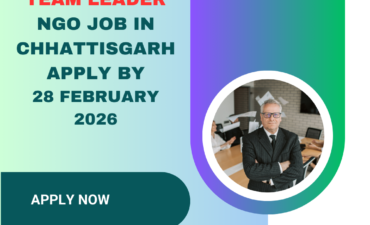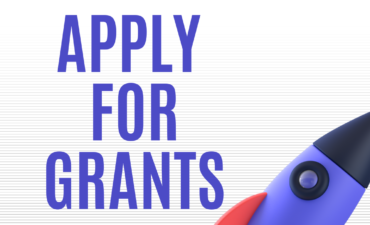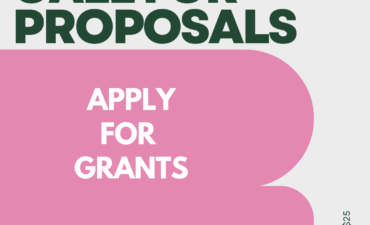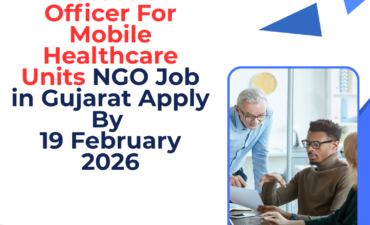Introduction: How to Craft a Robust Evaluation Plan for Optimal Impact in NGO Projects, In the dynamic landscape of non-governmental organizations (NGOs), the success of projects hinges not only on their well-intentioned initiatives but also on their ability to measure, assess, and adapt. Crafting a robust evaluation plan is a pivotal step towards ensuring the optimal impact of NGO projects. As the socio-economic and environmental challenges continue to evolve, NGOs must equip themselves with effective tools to gauge the efficacy of their endeavors.
This article delves into the essential components of constructing an evaluation plan tailored to the unique context of NGO projects. By doing so, NGOs can navigate the complexities of their work with greater precision, make informed decisions, and ultimately enhance their capacity to bring about positive and sustainable change.
Join us on a journey through the key elements that constitute a comprehensive evaluation plan, understanding the challenges faced, exploring real-world examples of successful implementations, and discovering valuable resources to empower NGOs in their pursuit of impactful and meaningful outcomes. Let’s unravel the intricacies of crafting evaluation plans that not only meet the immediate needs of projects but also contribute to the overarching mission of NGOs in creating lasting positive change.
Brief overview of the importance of evaluation plans in NGO projects
A robust evaluation plan is the compass that guides non-governmental organizations (NGOs) through the intricate terrain of their projects, ensuring that their efforts translate into meaningful impact. Evaluation plans play a pivotal role in systematically assessing the effectiveness, efficiency, and sustainability of NGO initiatives. By establishing clear objectives, involving stakeholders, and employing appropriate data collection methods, these plans provide a structured framework for monitoring progress and making informed decisions.
In the dynamic landscape of NGOs, where resources are often limited and challenges multifaceted, a well-crafted evaluation plan becomes a strategic imperative. It not only helps in quantifying the success of projects but also identifies areas for improvement, enabling NGOs to adapt and refine their approaches. The importance of evaluation plans lies in their ability to enhance accountability, transparency, and the overall efficacy of NGO projects, ultimately contributing to the broader goal of creating positive and lasting change in communities and beyond.
How to Craft a Robust Evaluation Plan for Optimal Impact in NGO Projects
Key Components of an Effective Evaluation Plan
- Clear Objectives and Goals
- Defining Measurable Outcomes: Clearly articulate specific, measurable, achievable, relevant, and time-bound (SMART) outcomes that serve as benchmarks for success. Measurable outcomes provide a concrete foundation for assessing the impact and effectiveness of NGO projects.
- Aligning Objectives with the NGO’s Mission: Ensure that the established objectives resonate with and directly contribute to the overarching mission and values of the NGO. Alignment guarantees that the evaluation plan reflects the organization’s core purpose, enhancing the coherence and purposefulness of project efforts.
How to Craft a Robust Evaluation Plan for Optimal Impact in NGO Projects
Stakeholder Involvement
Engaging key stakeholders in the evaluation process
Actively involve individuals and entities that have a vested interest or are affected by the NGO project in the evaluation process. This includes beneficiaries, community members, partners, and internal staff. By soliciting diverse perspectives, experiences, and insights, NGOs can attain a comprehensive understanding of the project’s impact and effectiveness. Engaging stakeholders fosters inclusivity, promotes transparency, and ensures that the evaluation process reflects the varied needs and perspectives of those directly or indirectly involved.
Data Collection Methods:
- Choosing Appropriate Qualitative and Quantitative Methods:
Selecting a judicious combination of qualitative and quantitative methods tailored to the nature of the NGO project. This ensures a well-rounded assessment, capturing both the measurable metrics and nuanced, qualitative insights. The choice of methods should align with the evaluation objectives and provide a comprehensive view of the project’s impact.
- Incorporating Tools for Accurate Data Gathering:
Implementing reliable and effective tools for data gathering, whether be it surveys, interviews, focus groups, or technological solutions. The accuracy of the collected data is crucial for informed decision-making, and incorporating appropriate tools enhances the reliability and validity of the evaluation results. The selection of tools should consider the project’s scope, context, and the characteristics of the target population.
How to Craft a Robust Evaluation Plan for Optimal Impact in NGO Projects
Timelines and Milestones:
- Establishing Realistic Timelines for Evaluation:
Define a well-structured and feasible timeline for the evaluation process. Setting realistic deadlines ensures that the evaluation aligns with the project’s lifecycle, allowing for thorough assessment without undue haste. Realistic timelines facilitate proper planning, resource allocation, and the execution of evaluation activities in a systematic and efficient manner.
- Identifying Key Milestones for Progress Assessment:
Break down the evaluation process into key milestones, enabling ongoing monitoring and assessment of project progress. Identifying milestones provides checkpoints to gauge the project’s trajectory, making it easier to identify successes, challenges, and necessary adjustments. Milestones serve as markers for achievement and aid in maintaining a proactive and adaptive approach throughout the evaluation period.
Tailoring Evaluation Plans to NGO Project Types:
- Case Studies: Evaluating Specific Projects
Conduct in-depth assessments of individual projects to provide a detailed understanding of their strengths, weaknesses, and overall impact. Case studies offer valuable insights into the intricacies of specific initiatives, allowing NGOs to identify best practices, learn from challenges, and make targeted improvements.
- Programmatic Evaluation: Assessing Broader Initiatives
Undertake comprehensive evaluations that focus on assessing the overall effectiveness and efficiency of broader programs or initiatives. Programmatic evaluations consider the interconnections between various projects, ensuring a holistic understanding of how they collectively contribute to the NGO’s overarching goals. This approach facilitates strategic decision-making at a higher organizational level.
How to Craft a Robust Evaluation Plan for Optimal Impact in NGO Projects
- Impact Evaluation: Measuring Long-Term Effects
Emphasize the assessment of long-term outcomes and effects to understand the lasting impact of NGO projects on communities and target beneficiaries. Impact evaluations go beyond immediate results, examining sustained changes and broader societal influences. This type of evaluation is crucial for gauging the true transformative power of NGO interventions over an extended period.
Challenges and Solutions in Evaluation Planning:
- Common Challenges Faced in Creating Evaluation Plans:
- Resource Constraints:
- Limited funding and human resources for comprehensive evaluation efforts.
- Data Collection Complexity:
- Difficulty in gathering accurate and relevant data due to the complexity of project activities.
- Stakeholder Resistance:
- Reluctance or resistance from stakeholders to participate in the evaluation process.
- Unclear Objectives:
- Ambiguous or undefined project objectives, hindering the establishment of measurable outcomes.
- Strategies for Overcoming Obstacles:
- Strategic Resource Allocation:
- Prioritize and allocate resources efficiently, focusing on critical aspects of the evaluation to maximize impact.
- Streamlined Data Collection:
- Employ efficient data collection methods and technologies, emphasizing simplicity and relevance.
- Stakeholder Engagement and Communication:
- Foster open communication, engage stakeholders early in the planning process, and emphasize the mutual benefits of their involvement.
Objective Refinement:
- Work collaboratively with stakeholders to clarify and refine project objectives, ensuring they are specific, measurable, and aligned with the overall mission.
By addressing these challenges with strategic solutions, NGOs can enhance the effectiveness of their evaluation planning processes and navigate potential obstacles more effectively.
How to Craft a Robust Evaluation Plan for Optimal Impact in NGO Projects
Examples of Successful Evaluation Plans in NGO Projects:
- Case Studies Showcasing Well-Executed Evaluation Plans:
- Health Outreach Initiative:
- Demonstrates a comprehensive evaluation plan that assessed the impact of a health outreach program in a rural community.
- Utilized a mix of quantitative data on improved health indicators and qualitative insights from community feedback.
- Showcased successful health outcomes and identified areas for program refinement.
- Education Empowerment Project:
- Highlights a well-structured evaluation plan for an education initiative targeting marginalized youth.
- Incorporated pre-and post-assessment measures to track academic improvements and conducted interviews to understand the project’s broader societal impact.
- Provided valuable insights into educational empowerment strategies for vulnerable populations.
How to Craft a Robust Evaluation Plan for Optimal Impact in NGO Projects
- Lessons Learned from Successful Implementations:
- Community Engagement Best Practices:
- Emphasized the importance of early and ongoing stakeholder engagement, showcasing how it contributed to successful data collection and project acceptance.
- Adaptive Strategies for Dynamic Contexts:
- Explored cases where NGOs adjusted their evaluation plans in response to unexpected challenges or changing project dynamics, showcasing the importance of flexibility.
- Technology Integration for Efficient Data Collection:
- Examined instances where NGOs successfully integrated technology tools into their evaluation plans, improving data accuracy and easing the logistical burden of data collection.
By studying these examples and lessons learned, NGOs can glean insights into effective evaluation strategies and apply them to enhance the impact and efficiency of their own projects.
Tools and Resources for Creating Evaluation Plans:
- Software and Platforms for Streamlined Planning:
- EvalTools Pro:
- Comprehensive software offering features like outcome mapping, data visualization, and collaborative project management for efficient evaluation planning.
- SurveyMonkey:
- Versatile survey tool enabling NGOs to collect and analyze data, essential for quantitative aspects of evaluation plans.
How to Craft a Robust Evaluation Plan for Optimal Impact in NGO Projects
- Guidelines and Templates for NGOs:
- UNICEF Evaluation Guidelines:
- Provides a framework and best practices for planning and conducting evaluations in the context of humanitarian and development work.
- Better Evaluation Framework:
- Online resource offering guidelines, templates, and case examples to assist NGOs in crafting effective evaluation plans.
Training and Capacity Building:
- Importance of Training NGO Staff in Evaluation Methods:
- AEA eStudies Program:
- Online courses by the American Evaluation Association (AEA) to enhance the skills of NGO staff in various aspects of evaluation planning and implementation.
- CDC Evaluation Training and Resources:
- Training modules provided by the Centers for Disease Control and Prevention (CDC) focusing on evaluation in public health, suitable for NGOs operating in this sector.
- Building Internal Capacity for Ongoing Success:
- IDRC’s Capacity Building Resources:
- Resources and toolkits by the International Development Research Centre (IDRC) aimed at building the internal capacity of NGOs in evaluation and project management.
- EvalPartners:
- Global network offering resources and guidance on strengthening evaluation capacities within organizations, promoting sustainability in evaluation efforts.
By leveraging these tools, guidelines, and training resources, NGOs can fortify their capacity for effective evaluation planning and implementation, ensuring ongoing success and impact in their projects.
How to Craft a Robust Evaluation Plan for Optimal Impact in NGO Projects
To encapsulate, crafting a robust evaluation plan is not just a procedural necessity for non-governmental organizations (NGOs); it is the compass that ensures their endeavors lead to meaningful and lasting impact. As we conclude this exploration into the essential components, challenges, and success stories of evaluation planning, it becomes evident that the ability to measure, adapt, and learn is paramount in the realm of NGO projects. By embracing clear objectives, engaging stakeholders, employing effective data collection methods, and tailoring plans to project types, NGOs can navigate challenges successfully.
Armed with the right tools, resources, and a commitment to internal capacity building, NGOs can turn evaluation planning from a mere obligation into a powerful strategy for positive change. As the sector evolves, the lessons learned and shared experiences become invaluable, guiding NGOs toward greater effectiveness, transparency, and sustainable impact. It is through these deliberate and well-crafted evaluation plans that NGOs can continue their mission of making a tangible difference in the lives of the communities they serve.
Related Good Reads, Link
Hey, STEAL our Best Premium Content For Absolutely Free, Check Out the Links below
HOPE these will add value to your existing skills and knowledge
Our information bears no cost (it’s absolutely FREE), don’t let valuable information slip away.
Join our community of avid readers who are always in the know. Subscribe to our website; stay connected and engaged with the latest news, trends, and developments by subscribing today.
(PUSH the bell ICON)
Leverage the power of knowledge to propel your organisation to new heights. Don’t miss out to explore our content
- Latest Funds for NGOs,
- NGO Jobs
- Resources (Helpful Guides and Courses)
- Premium Resources
- NGO related articles
Empowering Humanity through Funds, Resources and Collective Action
Sharing is Appreciated

